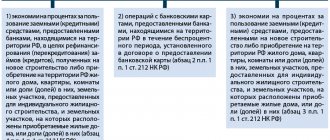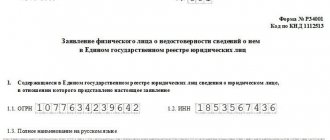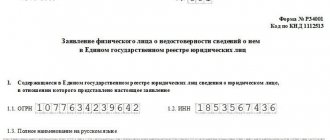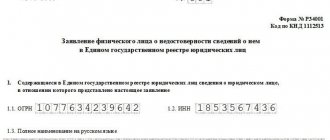Should an organization always act as a tax agent and withhold personal income tax?
If compensation payments are made by court decision, the developer is obliged to pay the shareholder exactly the amount specified in the decision (Clause 2 of Article 13 of the Code of Civil Procedure of the Russian Federation). Thus, if the amount of personal income tax is allocated in a court decision, the developer is obliged to withhold it.
If the court decision does not indicate the amount of tax, the developer must pay the amount appointed by the court in full and notify the tax office and the taxpayer-shareholder of the impossibility of withholding personal income tax (clause 5 of Article 226 of the Tax Code of the Russian Federation).
In this case, the obligation to file a declaration and pay tax falls on the individual recipient of the income.
This point of view is reflected in Letters of the Ministry of Finance of Russia dated 05/24/2013 N 03-04-06/18724, dated 03/05/2013 N 03-04-05/4-171, dated 06/10/2010 N 03-04-06/10-21 , dated April 22, 2016 No. 03-04-05/23587).
What is subject to personal income tax and what is not
Is compensation received from the developer subject to tax? Is a penalty imposed by a court decision or paid voluntarily by the developer subject to tax?
When calculating the tax base, the following are taken into account:
- penalties recognized by the developer in accordance with the settlement agreement, that is, without the shareholders going to court;
- penalties (as well as fines, penalties, losses, interest, reimbursement of court costs and state fees) specified in the court decision (resolution);
Thus, personal income tax must be paid on all income of a participant in shared construction received as a result of a dispute with the developer (on all amounts collected under the writ of execution and specified in it).
Is the compensation payment that a shareholder can receive for personal injury and expenses incurred in connection with this subject to tax? Answer: No. Also, personal income tax is not paid on the amount of compensation for moral damage).
What are the further actions of an individual who has received income in the form of a penalty?
An individual recipient of income will report on income received in Form 3-NDFL, Order of the Federal Tax Service of Russia dated December 24, 2014 No. ММВ-7-11/ [email protected] (hereinafter referred to as the Order).
Clause 1.4 of the Order establishes that when filling out form 3-NDFL, the values of the indicators “are taken from certificates of income and withheld amounts of taxes issued by tax agents at the request of the taxpayer, settlement, payment and other documents available to the taxpayer, as well as from those made on the basis the specified settlement documents."
This means that an individual can fill out the 3-NDFL form on the basis of a 2-NDFL certificate, because sections 3 and 5 of the form contain all the amounts necessary for this. Of course, a notification drawn up by a tax agent in simple written form can also serve as “other documents”.
However, it is not difficult for a tax agent to duplicate the 2-NDFL certificate, compiled for submission to the tax authority, for transmission to the taxpayer, and in addition, this minimizes the possibility of errors.
According to paragraph 3 of Art. 230 of the Tax Code of the Russian Federation, at the request of the taxpayer, tax agents issue certificates to individuals regarding the income received by individuals and the amounts of tax withheld in the form approved by the federal executive body authorized for control and supervision in the field of taxes and fees. We are also talking about form 2-NDFL.
Do I need to pay tax on the penalty?
Can a penalty be recognized as income?
In theory, a penalty is a sum of money that is determined by law or contract for violation or delay of obligations. That is, the penalty can be legal or contractual, according to the law, say, an organization can pay you a penalty for violating your consumer rights, the penalty is also paid in case of non-payment of alimony, etc., as well as a contractual penalty, when, for example, under a supply contract, goods are delayed and for Every day of delay, a penalty (fine, penalty) is charged in the amount of a certain percentage of the cost of the goods supplied.
That is, the penalty is punitive in nature.
For example, if the penalties are compensatory and not punitive in nature, say if you bought a product, it turned out to be of poor quality and you were harmed, the seller is obliged to compensate you for the damage caused by such a product or service, and also, at your request, to return to you what you paid for the defective product or service, a sum of money and such payments are compensatory in nature, and payments to compensate for damage or harm are not taxed, since in principle they do not bring economic benefit, and on the basis of paragraph 1 of Article 41 of the Tax Code of the Russian Federation, economic benefit is recognized as income, and call it benefit compensation for damage and a refund of the amount you paid for a low-quality product or service is not possible, since you are compensated for the damage caused, that is, what you already had before is returned.
But the penalty is punitive in nature, in case your requirements are refused to be satisfied voluntarily, or there is a delay in fulfilling the requirements.
The law says so, a penalty is a fine or penalty, there is no talk of any compensation and it is applied only to
Can a penalty be classified as income?
Article 208 of the Tax Code of the Russian Federation lists all the income of a citizen of the Russian Federation that is taxed, there is no penalty among them, but Article 208 has subparagraph 10 of paragraph 1, which says that other income received by the taxpayer as a result of carrying out activities in the Russian Federation is taxed.
The ruling of the Constitutional Court of the Russian Federation dated July 19, 2016 No. 1460-O tells us the following.
That only economic benefits are recognized as income, that is, if the funds received by a citizen or organization while carrying out economic activities brought them economic benefits, then this is income and it is taxed. This means that, as mentioned above, taxes are not imposed on payments that do not bring economic benefit; such payments include compensation, such as compensation for harm (damage).
Common mistakes when withholding personal income tax from penalties and fines by court decision
Error 1. It is necessary to correctly understand who, when, should calculate and pay personal income tax on penalties based on a court decision.
So, the organization that pays income to an individual is a tax agent. This is evidenced by paragraph 1 of Art. 226 Tax Code of the Russian Federation. Consequently, it is she who must withhold and transfer personal income tax from the income of an individual.
This rule fully applies to income paid in the form of penalties and fines, but with some reservations. It should be noted that here we are talking about a situation where the organization does not make other payments to an individual. If the court that made the decision indicated in its ruling a specific amount of the penalty and the amount of tax to be paid, then the debtor (organization), upon actual payment, will have to withhold and transfer personal income tax for the individual.
If there is no such division (in terms of the amount of the penalty and personal income tax), then the organization essentially does not have the opportunity to withhold and deduct tax. Then she must inform the individual and the Federal Tax Service in writing:
- about the inability to pay personal income tax;
- the amount of income (in the form of a penalty, a fine) from which tax must be withheld;
- the amount of unwithheld personal income tax.
This must be done within the deadline immediately after the last tax period. After this, payment of the tax falls entirely on the shoulders of the individual.
Features of paying income on the profits of organizations from the collected penalty
Let's consider the features relating to the payment of income on the profits of organizations. According to sub. 13 clause 1 art. 265 of the Tax Code of the Russian Federation, non-operating expenses include expenses in the form of fines, penalties and (or) other sanctions for violation of contractual or debt obligations recognized by the debtor or payable by the debtor on the basis of a court decision that has entered into legal force, as well as expenses for compensation for damage caused . Thus, the obligation to take into account the resulting penalty for income tax purposes is directly established by the provisions of the Tax Code of the Russian Federation. The same position is set out in letters of the Ministry of Finance of Russia dated January 14, 2016 No. 03-03-06/1/609, dated December 1, 2014 No. 03-03-06/1/61165.
It should be taken into account that in order to recognize non-operating income, it is important that the debtor recognizes the obligation to make such payment. Acknowledgment of a debt can be evidenced not only by the conclusion of an agreement to acknowledge the debt, but also by the presence of letters or conclusive actions of the debtor. For example, when the debtor independently paid the debt in accordance with the provisions of the agreement. State bodies adhere to the same position (Letter of the Ministry of Finance of Russia dated July 24, 2015 No. 03-03-06/1/42838). As explained by the Supreme Arbitration Court of the Russian Federation in Decision No. 8551/03 dated August 14, 2003, agreement by the parties to the contract on the terms of a penalty in itself is not enough for the creditor to take into account the amounts due as non-operating income in the absence of objections from the debtor.
You may be interested in: Services for bankruptcy of legal entities.
The Ministry of Finance found exceptions
Previously, the Russian Ministry of Finance took a different position. In particular, it was pointed out that it was necessary to pay value added tax on amounts received as payment of penalties. This position, for example, is contained in letters of the Ministry of Finance of Russia dated 08/17/2012 No. 03-07-11/311, dated 08/09/2011 No. 03-07-11/214, dated 08/16/2010 No. 03-07-11/356.
However, according to government authorities, there is an exception to the above rule that there is no need to pay VAT. In particular, when it comes to penalties, which in essence actually relate to the element of pricing. The need to apply this approach is indicated in letters of the Federal Tax Service of Russia dated 04/03/2013 No. ED-4-3/ [email protected] , Letters of the Ministry of Finance of Russia dated 10/30/2014 No. 03-03-06/1/54946, dated 06/08/2015 No. 03 -07-11/33051, dated October 30, 2014 No. 03-03-06/1/54946, dated March 4, 2013 No. 03-07-15/6333). An example is a situation in which a fine is paid to the carrier (forwarder) for idle time of a vehicle when loading or unloading lasts longer than established by the contract.
This approach seems doubtful, since under such circumstances the penalty paid to the forwarder fits the definition contained in Art. 330 of the Civil Code of the Russian Federation, and is paid in case of violation of an obligation, does not require proof of the amount of losses incurred. In addition, in Art. 162 of the Tax Code of the Russian Federation directly states that for tax purposes those amounts are recognized that are associated with payment for goods (work, services) sold. In this case, the fact of sale of goods (work, services) is absent.
As for the application of the simplified taxation system, within the meaning of paragraph 3 of Art. 250, paragraph 1, art. 346.15, paragraph 1 of Art. 346.17 of the Tax Code of the Russian Federation, a penalty received from a debtor is taken into account in income in the period of its receipt. It should also be borne in mind that a debtor who has paid a penalty and applies a simplified taxation system does not have the right to reduce the tax base due to such payment. This is due to the fact that the payment of the penalty does not apply to the expenses, the list of which is established in clause 1 of Art. 346.16 Tax Code of the Russian Federation. A similar position is set out in the Letter of the Ministry of Finance of Russia dated 04/07/2016 No. 03-11-06/2/19835, and is also found in judicial practice (decrees of the Federal Antimonopoly Service dated 05.07.2010 in case No. A65-27157/2008, FAS Central District dated 05.03. 2010 in case No. A35-3674/07-C21, Nineteenth AAS dated September 28, 2009 in case No. A35-3674/07-C8).
It should also be borne in mind that an increase in the tax base in the case of applying a simplified taxation system is possible only after actually receiving payments from the debtor, which follows from paragraph 1 of Art. 346.17 Tax Code of the Russian Federation.
You may be interested in: Preparation of a legal opinion on tax issues.
Are fines paid to DDU participants subject to personal income tax based on a court decision?
Since penalties and fines paid by developers to a participant in an equity participation agreement have characteristics that allow them to be classified as economic benefits, they are the income of the person from whom personal income tax is withheld.
The list of income not subject to personal income tax is contained in Article 217 of the Tax Code.
Due to the fact that Article 217 of the Tax Code does not provide grounds for exempting the amounts of the specified fines and penalties from personal income tax, if they are paid by court decision, then personal income tax must be paid on such income in the prescribed manner.
This position was confirmed in paragraph 7 of the Review of the practice of courts considering cases related to the application of Chapter 23 of the Tax Code (approved by the Presidium of the Supreme Court of the Russian Federation on October 21, 2015).
It stipulates that the sanctions of consumer protection legislation are exclusively punitive in nature.
Their collection does not pursue the goal of compensating for losses (real damage) of the consumer.
Since the payment of amounts of such sanctions leads to the formation of property benefits for the consumer, they must be included in the income of an individual on the basis of the provisions of Articles 41, 209 of the Tax Code, regardless of the fact that the receipt of these amounts is due to a violation of the rights of an individual.










